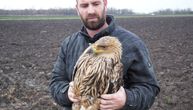Crows are attacking: Expert tells Telegraf how to protect ourselves, and what we should never do
"If we panic when a crow attacks us, it will continue to do that, so the attacks will be more frequent," biologist Kristijan Ovari told our portal
Crow attacks on people are being recorded in several parts of Belgrade every spring. The targets are mostly children and the elderly, while the injuries they suffer often have to medically treated.
Residents of Zagreb, Croatia are these days facing similar problems, unable to defend themselves from the "flying black bullies."
Doctors in Croatia are treating people with head injuries sustained during crow attacks on a daily basis.
We spoke to Kristijan Ovari, a biologist at the Belgrade Zoo, about whether crows attack "out of the blue" or if people provoke them to react in that way, and how to protect ourselves from these incidents.
"Crows have always followed people and have adapted to coexist with us in big cities," Ovari tells Telegraf.
"The urban ecosystem is growing, developing and evolving. As the city has developed, so crows continued to follow people and vultures, just as they have been doing through centuries. They are extremely important in the ecosystem, because they make extraordinary nests that other birds use when crows leave them."
Crows, Ovari points out, are extremely intelligent. He gave a vivid example - in order to eat a walnut, crows throw the whole fruit onto the road and patiently wait for cars to come along and crush its shell. Once that happens, they fly down and get their meal.
"The spring is the season when young crows are hatched. Their parents are very dedicated and caring, so they take great efforts to keep their offspring safe from harm," the biologist explained for Telegraf.
And that's exactly when the problem between the crows and the humans crops up. People pass by, not knowing that there are young crows in their nests near them, while older crows want to protect their young - at all costs.
"That is why crows caw, fly around, signal, look for ways to intimidate us, flap their wings, and sometimes land on the heads of people who happen near their nests," Ovari says, and adds:
"Crows are not stupid. If they assess our intentions, if they see that we are stable in the speed of our movement, then we will not be their target, because they will understand that we are not stopping to harm their young. On the other hand, small children and the elderly often pause, change the speed of movement, and crows interpret that as a danger to their offspring."
So, the advice to all those who pass through the parts of the town where crows have their nests is to walk a little faster, not make stops, and whenever possible, carry an umbrella to further protect themselves from crow attacks.
This Telegraf' interlocutor stressed that a crow learns to intimidate us - so once it learns that "lesson" it will persistently repeat it.
"If we panic when a crow attacks us, it will continue to do that, so the attacks will be more frequent," Ovari said.
If, on the other hand, a crow does attack, it is necessary to have the wound medically assessed.
"Crows are wild birds, there are various bacteria in their beaks, so it is best to see the doctor who will treat the wound with hydrogen or iodine and determine whether you should use an antibiotic cream," advises Ovari.
For those who have extreme fear of crow attacks, there's good news - these birds will stop menacing us in about ten days. That is when the young that hatched this spring will learn to fly, so their parents will have no reason to protect them the way they are doing right now.
(Telegraf.rs)

